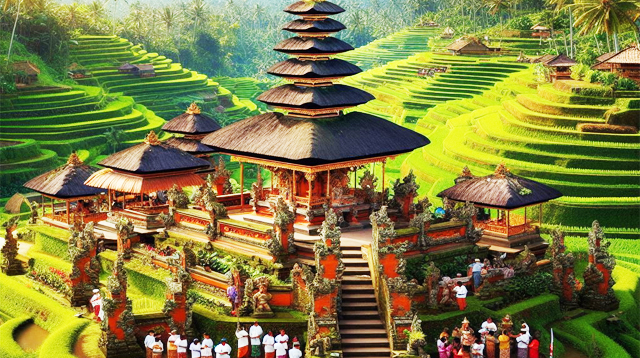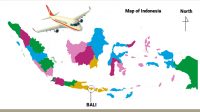TRI Hita Karana is one of the most important philosophical concepts in Hindu teachings, especially in Bali. Literally, Tri Hita Karana comes from Sanskrit and Balinese, which means “three causes of happiness.”
This concept emphasizes the balance and harmony between the three main elements that must be maintained in order to create a peaceful, prosperous, and harmonious life with the universe. The three elements are a harmonious relationship with God (Parhyangan), fellow human beings (Pawongan), and nature (Palemahan).
In the context of Hinduism and Balinese tradition, Tri Hita Karana is not only a spiritual guide but also a foundation in various aspects of social, cultural, and environmental life. This philosophy has been applied in everyday life by the Balinese people since ancient times until now, and is increasingly relevant amidst the challenges of modernization and globalization.
- Parhyangan: Harmony with God
The first aspect of Tri Hita Karana is Parhyangan, which refers to the harmonious relationship between humans and God. In Hinduism, the relationship with God or Ida Sang Hyang Widhi Wasa is very important because it is believed that all life comes from Him and all human well-being depends on His will.
In Balinese tradition, the relationship with God is manifested through various religious ceremonies and rituals, such as daily prayers, upakara, and celebrations of Hindu holy days such as Galungan, Kuningan, and Saraswati. Every house in Bali usually has a family temple (sanggah or merajan) as a place to pray and make offerings to God. Large temples are also spiritual centers that strengthen the relationship between Balinese people and God.
The application of Parhyangan in the modern era is also seen in social life. Despite the increasing challenges of materialism, Balinese people still maintain this spiritual tradition as a foundation for inner well-being. Religious ceremonies remain an inseparable part of life, reminding us that true happiness comes from closeness to the Almighty.
- Pawongan: Harmony with Fellow Humans
The second aspect, Pawongan, emphasizes the importance of maintaining good and harmonious relationships with fellow human beings. This concept teaches that personal happiness will not be achieved without the happiness of the community or social group around it. Mutual cooperation, helping each other, and living together are real manifestations of the application of Pawongan in everyday life.
In Balinese tradition, mutual cooperation is very important, especially in carrying out traditional and religious ceremonies. Balinese society has a banjar or hamlet system, which is a social organization that regulates communal life in the village. Each member of the banjar has the responsibility to help each other, both in religious ceremonies, celebrations, and daily activities such as farming and building village infrastructure.
Nowadays, the concept of Pawongan is increasingly important when society faces modern challenges such as individualism and urbanization. This social harmony continues to be maintained through community activities, both in the form of religious rituals, traditional events, and more modern social activities such as cooperation in developing the creative economy and tourism.
- Palemahan: Harmony with Nature
Palemahan is the third aspect of Tri Hita Karana, which emphasizes the importance of maintaining balance and harmony with the surrounding environment. In Balinese Hindu teachings, the universe is the abode of the gods and also the source of human life, so caring for nature is part of a spiritual obligation.
The application of Palemahan is very evident in the way Balinese people treat land, water, forests, and mountains. Agriculture in Bali, especially the subak system (traditional irrigation), is a perfect example of harmony between humans and nature. This system not only functions as an effective irrigation method, but also contains spiritual values, where farmers offer part of their harvest to the gods as a form of gratitude.
In the modern era, the concept of Palemahan faces major challenges, especially with massive development and increasing exploitation of nature. However, the Balinese people’s awareness of the importance of preserving the environment remains strong, and various environmental conservation efforts continue to be carried out. For example, in the tourism sector, many tourist villages in Bali apply the concept of ecotourism, where development is carried out with attention to the preservation of nature, such as Penglipuran Village and Munduk Village.
Tri Hita Karana in Today’s Life
Tri Hita Karana is not just an ancient concept related to spirituality and tradition. In today’s life, the values contained in Tri Hita Karana are increasingly relevant amidst various global challenges. Along with the increasing environmental crisis, social conflicts, and challenges spiritual in the modern era, this concept offers a comprehensive solution to create a more harmonious and sustainable life.
In economic development, Tri Hita Karana has been adopted as the philosophical foundation of sustainable tourism in Bali. Many hotels, resorts, and other tourism sectors apply this concept by maintaining a balance between environmental sustainability, social responsibility, and spiritual values. Environmentally friendly programs and cultural preservation are also growing, with the aim of maintaining the sustainability of nature and Balinese cultural heritage.
Conclusion
Tri Hita Karana is a legacy of Hindu religious philosophy and Balinese tradition that teaches the importance of maintaining a balance between God, humans, and nature. Although it comes from ancient teachings, the values contained in it remain relevant today. The application of this concept in modern life is not only a form of cultural preservation, but also as a solution to facing global challenges, both in terms of the environment, social, and spiritual.
By practicing Tri Hita Karana, we can achieve a more harmonious, sustainable, and meaningful life, both in Bali and in the increasingly connected global world.










